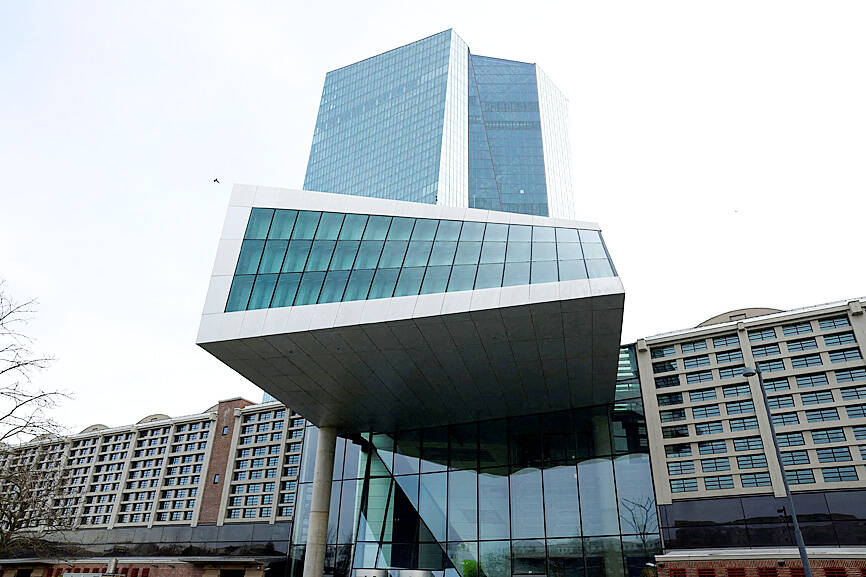The Philippine central bank yesterday slowed the pace of its interest-rate increases as it seeks to cool still-hot inflation while allowing itself some policy maneuver room in the event of risks from a global banking turmoil.
Bangko Sentral ng Pilipinas (BSP) raised the overnight reverse repurchase rate by 25 basis points to 6.25 percent, as seem by all but one of 22 analysts in a Bloomberg survey. One predicted a pause.
That takes the cumulative increases since May last year to 425 basis points, which included four half-point moves and two 75-basis-point actions.

Photo: Reuters
A slower headline inflation reading last month provided Philippine authorities room to downshift, and also space to consider how the fallout of the banking tumult could spur uncertainties.
Still, the core measure gaining at the fastest pace in 24 years last month leaves little room to pause, especially when the US Federal Reserve has signaled its resolve to stay its course on tightening.
BSP’s decision came hours after the US central bank raised interest rates by 25 basis points, and signaled more to come as Fed Chairman Jerome Powell reiterated the intent to bring prices under control.
Yesterday’s action makes the Philippines one of the last bastions of tightening in Southeast Asia, where some have already shifted to pause. Vietnam last week went a step further to reduce a key rate to support economic activity.
The Hong Kong Monetary Authority yesterday also raised its benchmark interest rate by 25 basis points, increasing the base rate to 5.25 percent from 5 percent, it said in a statement.
Meanwhile, the European Central Bank (ECB) will probably need to raise borrowing costs more, though the bulk of tightening is already done, Governing Council member Madis Muller said yesterday.
“Looking at how quickly and sharply the interest-rate increases have taken place in less than a year, I dare say the bigger part of this is behind us and now it is a time for adapting and coping,” Muller told Raadio 2 in an interview. “We need to get inflation under control, need to keep working until we have confidence that the back bone of inflation is broken.”
Muller, who heads Estonia’s central bank and is among more hawkish policymakers, spoke a week after the ECB hiked by a half point, though — given market turbulence — it held off on providing guidance on what is next.
ECB officials are growing increasingly confident that the eurozone banking system has withstood financial turmoil, allowing them to envisage resuming interest-rate increases in due course, people with knowledge of the matter said.
Inflation is a bigger problem than higher borrowing costs, Muller said.

To many, Tatu City on the outskirts of Nairobi looks like a success. The first city entirely built by a private company to be operational in east Africa, with about 25,000 people living and working there, it accounts for about two-thirds of all foreign investment in Kenya. Its low-tax status has attracted more than 100 businesses including Heineken, coffee brand Dormans, and the biggest call-center and cold-chain transport firms in the region. However, to some local politicians, Tatu City has looked more like a target for extortion. A parade of governors have demanded land worth millions of dollars in exchange

Hong Kong authorities ramped up sales of the local dollar as the greenback’s slide threatened the foreign-exchange peg. The Hong Kong Monetary Authority (HKMA) sold a record HK$60.5 billion (US$7.8 billion) of the city’s currency, according to an alert sent on its Bloomberg page yesterday in Asia, after it tested the upper end of its trading band. That added to the HK$56.1 billion of sales versus the greenback since Friday. The rapid intervention signals efforts from the city’s authorities to limit the local currency’s moves within its HK$7.75 to HK$7.85 per US dollar trading band. Heavy sales of the local dollar by

Taiwan Semiconductor Manufacturing Co’s (TSMC, 台積電) revenue jumped 48 percent last month, underscoring how electronics firms scrambled to acquire essential components before global tariffs took effect. The main chipmaker for Apple Inc and Nvidia Corp reported monthly sales of NT$349.6 billion (US$11.6 billion). That compares with the average analysts’ estimate for a 38 percent rise in second-quarter revenue. US President Donald Trump’s trade war is prompting economists to retool GDP forecasts worldwide, casting doubt over the outlook for everything from iPhone demand to computing and datacenter construction. However, TSMC — a barometer for global tech spending given its central role in the

An Indonesian animated movie is smashing regional box office records and could be set for wider success as it prepares to open beyond the Southeast Asian archipelago’s silver screens. Jumbo — a film based on the adventures of main character, Don, a large orphaned Indonesian boy facing bullying at school — last month became the highest-grossing Southeast Asian animated film, raking in more than US$8 million. Released at the end of March to coincide with the Eid holidays after the Islamic fasting month of Ramadan, the movie has hit 8 million ticket sales, the third-highest in Indonesian cinema history, Film